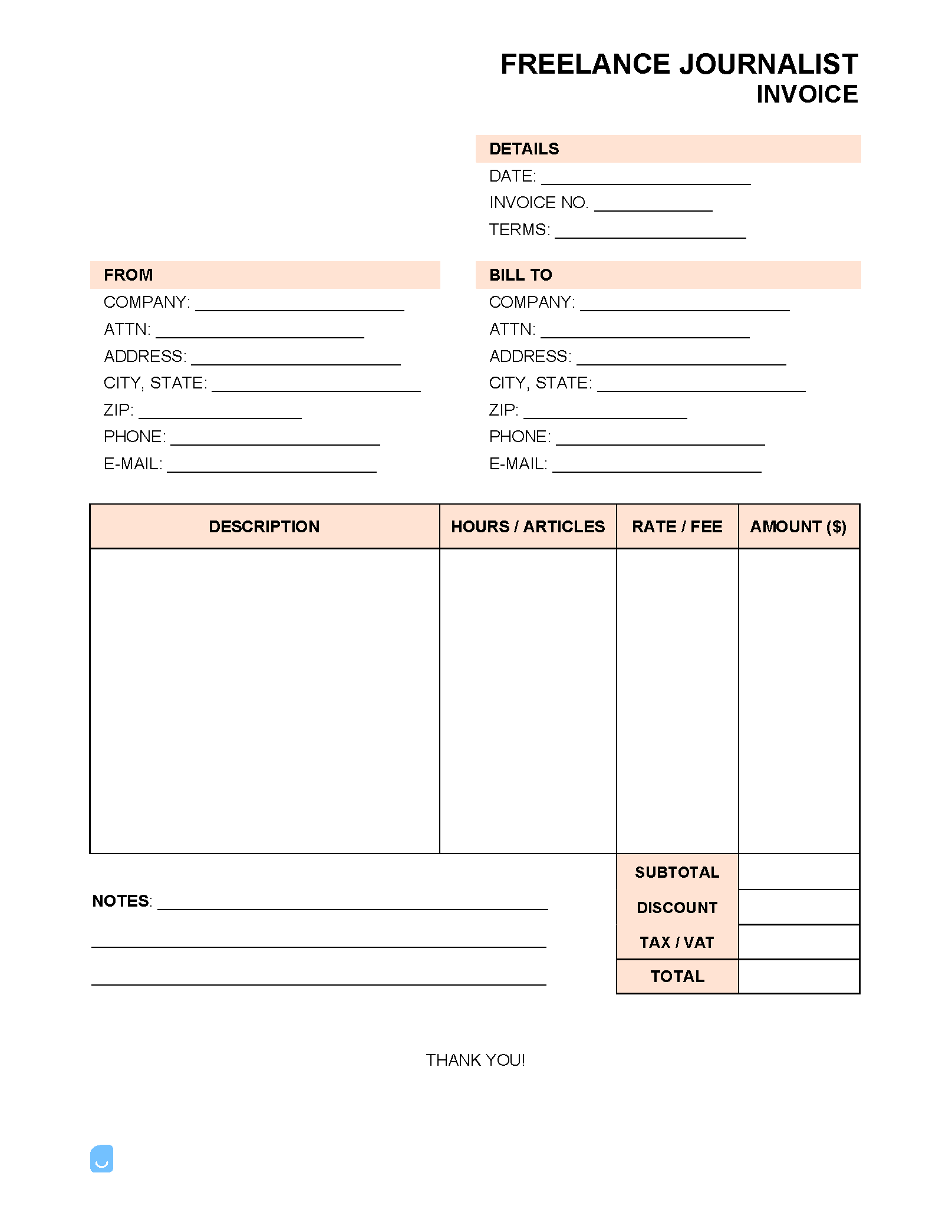Freelance Journalist Invoice Template
A freelance journalist invoice is a billing document used by freelance journalists to formally request payment for work completed or delivered. The word “freelance” indicates the journalist isn’t employed by a single company but, rather, is open to working for anyone so long the pay and services align with their needs. Due to the predominantly online nature of modern freelance journalism, invoices are rarely issued in-person or through the mail but are typically sent over email or other digital platforms.

How to Create a Professional Freelance Journalist Invoice That Gets You Paid
Freelance journalists need to keep track of the stories or articles they have written, when those stories or articles were published, and how much they were paid for each one. They will also need to track any expenses incurred while working on a story, such as travel costs, phone calls, and research materials. They are essentially their own business, so it is important for them to keep accurate records of income and expenses.
Types of Freelance Journalism
From a broad perspective, being a journalist entails having a solid knowledge base in grammar and vocabulary, as well as an ability to write in various tones and styles. Apart from that, journalists can differ significantly depending on the field in which they write. For those looking to become a freelancer, understanding the different types of writing possible is essential. According to CrowdSource, there are six (6) general types of freelance journalists.
6 Types of Freelance Journalists
- Web Content Writer – Being a web content writer can include writing for blogs, social media pages, or creating researched articles of varying lengths. The principal underlying purpose for web content is to rank on Google or other search engines, which can require writers to know about SEO (Search Engine Optimization).
- Ghostwriter – Freelancers that ghostwrite for a blog, book, or other publication attribute their writing to another person. The writer is a “ghost,” meaning readers will not know any writer other than the author’s name on the blog or book cover was involved in creating the work.
- Business Writer – Companies recruit business writers to write complicated business plans, press releases, white papers, business proposals, eBooks, training materials, employee policy, and other copy pertaining to the company.
- Newspaper / Periodical Writer – These writers write about news, sports, the weather, and other subjects.
- Instructional Writer – Instructional writers are responsible for writing content that is used for educational purposes. This includes the writing of textbooks, tests, lessons, and other course materials. More often than not, instructional writers are experts in the educational topic(s) they are hired to write for.
- Technical Writer – This type of writing requires an expert in the subject being written about. Includes maintenance books, product manuals, and articles in which an exceedingly complex topic is broken down in a way the everyday reader will understand.
Freelance Journalist Salary & Hourly Rate ($/hr)
In the United States, the average journalist earns the following:
It’s important to note that novice journalists will (most likely) earn significantly less than the values shown above due to their limited experience.
How to Find Freelance Journalist Gigs
It’s a good idea to reach out to newspapers and magazines in your area to let editors and publishers know you’re available and on-call for any stories they might need that exceed the capacity of their staff. It’s an even better idea to find and pitch stories. You can also use job sites such as:
Tips for Success as a Freelance Journalist
If you’re new to freelancing, you might consider the following tips.
- Find a niche. If you develop expertise and a wealth of knowledge and experience reporting on a particular subject or in a particular area, then editors and publishers are likelier to remember you when they want a story that’s in your niche.
- Connect with your community. Through networking events and reaching out directly, you can get to know journalists in your area. That way, when they hear about a story you might be a good fit for, they’ll have your contact information and they’ll remember you.
- Research how to pitch. A well-crafted pitch is the most effective way to land a story with a publication. This guide from the Society of Professional Journalists can be a good place to start.
What to Include on a Freelance Journalist Invoice
What information should be included on a freelance journalist invoice? Invoices for freelance journalists should include the following information:
- The name, address, and contact information of the journalist
- Name and contact information of client (e.g. editor or publisher)
- A description of the services provided, including the date(s) on which the services were provided
- Word count
- Rate per word
- The total amount due for the services provided
- Accepted payment methods (e.g. credit card, check, cash, PayPal, app-based methods, etc.)